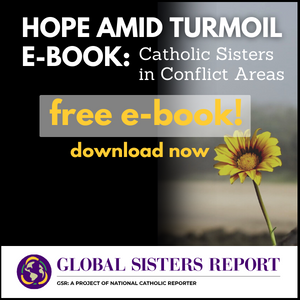Old is good. If you’ve ever had a tattered shirt you can’t throw out because of all the good times and happy memories rubbed into it, you’re a fan of the old too. Old friends are irreplaceable even as we open our lives to receive new ones. We may admit it’s time to purchase a new couch yet still look ruefully at the broken-in one we’re about to push to the curb. While old can be a pejorative, folks of a certain age—including me—would gladly argue the case for the occasional utility and unusual beauty of the antique.
Still, many of us are equally attracted to the new. My 93-year-old mother has an understandably deep affection for former days and ways, yet she continues to buy new clothes even though she could probably ride out the rest of her days with the closetful she has. Incoming catalogues proclaim the gospel of fast fashion: delightful new styles, colors, patterns, and textures. How can anyone resist?
It’s unfair to rib Mom about her purchasing habits without confessing my own. There’s a reason my mailbox is likewise crammed with catalogues, while my email inbox overflows with invitations to spend, spend, spend. Newness promises a solution to every problem, improved function or capacity, greater comfort and ease. Fresh possessions delight the eye with their twinkling perfection. Am I the only person who can stain, mar, or break a new purchase within 10 minutes of ownership? New things don’t stay pristine very long, which means the search for the new is relentless.
No wonder, then, that, by means of the prophet Isaiah, God lures us into dreaming of a better future with the promise of a fresh start. Behold, as we say in Bible-speak: Here comes the new! Make room in your hearts, minds, and neighborhoods for what hasn’t been before!
If our present reality is cramped, painful, or just plain boring, we may leap up at such a prophetic message. Like the young fishermen who drop their nets to follow Jesus, something novel sounds pretty darn good when the familiar is a yawning dead end. However, if the present situation happens to be cushy and profitable, any sort of changed perspective may appear as a threat. Keep that new idea at bay! Crush it, kill it, and jail anyone who dares to speak of it!
Each generation of believers must wrestle with the arrival of the new. Inevitably we moan about changes in the liturgy, the advent of the new pastor, and what may appear to be a capitulation of religion to secular values in any reexamined teaching. Particularly when it comes to religion, we may demand that the very air not move within these sacred walls.
Meanwhile, we same defenders of the status quo about the wording of every last prayer at Mass may wish the church might adjust its attitude concerning some matters dear to our hearts. Perhaps we’d like canon law to be more compassionate about second marriages after the first one crashes and burns. Maybe mandatory celibacy for priesthood gives us the itch, or the roles for women in church leadership seem appallingly stifled. Perhaps we’d like the magisterium to stop talking about our gay children in terms that make them sound like mutant beings. Or we’d appreciate a stronger social justice presence by our leadership: not just words but serious engagement.
We find ourselves in a constant push-me-pull-you situation between the old and the new. We cherish the old; we hunger for the new. This sounds inconsistent. It’s actually quite human.
Acknowledging the tension between these two affections helps us appreciate the teaching on family life that Pope Francis asks us to ponder this year in the 2016 apostolic exhortation Amoris Laetitia (On Love in the Family). As this teaching rightfully asserts, “The welfare of the family is decisive for the future of the world and that of the Church.” Therefore, it’s vital to get family right and to make the domestic sphere our priority. We’re invited to walk a tightrope with Pope Francis as he considers where we find ourselves in the 21st century: balancing traditional teaching with new directions and challenges the modern family is facing. It’s a breathless undertaking. So is the future.
I realize not everyone reading this may feel personally addressed by the notion of “family life.” I’m thinking here of my 93-year-old mother, a widow who lives independently; retired couples whose children have long since moved away; young single adults who don’t have marriage on their minds; religious in communal settings; priests dwelling alone in their rectories. All of these may imagine they are post-family and that the Year of the Family we’re currently pondering doesn’t directly concern them.
It does. The welfare of the family must concern me, though I’m in my 60s, have lived alone most of my adult life, and never had the personal opportunity to have children. None of this suggests I’m without family or responsibility toward upcoming generations. Being part of society makes the future of the world mine to protect. Being Catholic makes the future of the church my responsibility. Church teaching tells us that our triune God is a communion of love, and so is the family. Family life, therefore, is a symbol of God’s inner life. Heavens! This should blow our minds. The inner life of God can be seen in any setting that teaches us the path to love. We reside in such settings whether maritally or pastorally, communally or deliberately in other ways the teaching doesn’t explicitly articulate.
I’ve learned something significant regarding context from my nieces. They’re all 20- and 30-somethings. While a few are married, all of them cherish their friendships in the highest possible key. We older generations love our friends too, but maybe not to the same degree. To younger folks who endured the fragmentation of divorce, single-parent homes, and fluctuating domestic contexts more so than previous generations, friendship has perhaps become the most vital bond. They rely on marriage less as the ultimate construct of stability and permanence. For many of them, it wasn’t.
Amoris Laetitia recognizes that it’s hard for young people to listen to talk about the family being the domestic church, cradle of fidelity, place of spiritual nurture, etc., as they look out across the modern world or contemplate their own upbringing. Upcoming generations look at marital commitment with a distinct fear of failure. They’re suspicious of the bureaucratic elements of marriage, when institutions have harbored so much betrayal. They guard their personal freedom, having seen what can happen when it’s surrendered too blindly. Economic stressors may make marriage seem frankly impossible. The hesitancy to marry or the outright rejection of marriage as an ideal is understandable from this perspective.
Family life, therefore, is a symbol of God’s inner life. Heavens! This should blow our minds.
Yet Pope Benedict XVI’s words in Caritas in Veritate (On Integral Human Development) about family love being the school of the common good continue to ring true. The family context, experienced so early, is especially useful in teaching why things can’t always be done my way, how others have feelings too, why communication is a skill we must hone, why listening is essential, why forgiveness is the most valuable element in relationships, and why generosity and sacrifice are necessary if love is to be authentically given and received.
This conversation between the old generations and the new generations about the essential vocation of family life is vital to have. But we have to be sure that we’re backing it up with more than just words.
This article also appears in the April 2022 issue of U.S. Catholic (Vol. 87, No. 4, pages 47-49). Click here to subscribe to the magazine.
Image: iStock/Koh Sze Kiat















Add comment